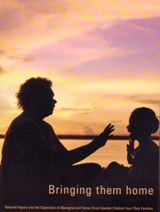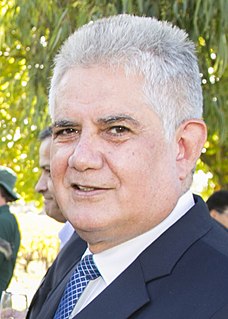Related Research Articles

The Aboriginal and Torres Strait Islander Commission (ATSIC) (1990–2005) was the Australian Government body through which Aboriginal Australians and Torres Strait Islanders were formally involved in the processes of government affecting their lives. A number of Indigenous programs and organisations fell under the overall umbrella of ATSIC.

The second part of the 1967 Australian referendum related to Aboriginal people. The 1967 Australian referendum, called by the Holt Government on 27 May 1967, consisted of two parts, with the first question relating to Aboriginal Australians. It asked for approval for two amendments to the Australian constitution based on this second question. The amendments related to counting Aboriginal people in the Australian census, and allowing the government to legislate separately for Aboriginal people. Technically this referendum question was a vote on the Constitution Alteration (Aboriginals) Act 1967, which became law on 10 August 1967 following the results of the referendum.
Reconciliation Australia is a non-government, not-for-profit foundation established in January 2001 to promote a continuing national focus for reconciliation between Indigenous and non-Indigenous Australians. It was established by the Council for Aboriginal Reconciliation and subsequently superseded that body. In 1991, the Australian Parliament voted unanimously to establish the Council for Aboriginal Reconciliation and a formal reconciliation process. Parliament had noted that there had been no formal process of reconciliation and that it was “most desirable that there be such a reconciliation” by the year 2001, marking the centenary of Federation.
The Department of Immigration and Multicultural Affairs and Indigenous Affairs was an Australian government department that existed between November 2001 and January 2006.
The Registrar of Indigenous Corporations is an Australian Government statutory office appointed by the Minister for Families, Housing, Community Services and Indigenous Affairs under the Corporations Act 2006.
Aboriginal and Torres Strait Islander Services was part of the now disbanded Aboriginal and Torres Strait Islander Commission (ATSIC).

The former Australian Department of Families, Housing, Community Services and Indigenous Affairs (FaHCSIA) was a department of the Government of Australia located in Greenway in Canberra. It was formed in 2007 and absorbed the former Department of Families, Community Services and Indigenous Affairs. As a result of an Administrative Arrangements Order issued on 18 September 2013, the Department of Social Services was established and assumed most of the responsibilities of FaHCSIA; with indigenous affairs functions assumed by the Department of the Prime Minister and Cabinet.

The Department of Health is a department of the Government of Australia charged with overseeing the running of Australia's health system, including supporting universal and affordable access to medical, pharmaceutical and hospital services, as well as helping people to stay healthy through health promotion, participation and exercise and other disease prevention activities.
The Department of the Prime Minister and Cabinet (PM&C) is an Australian Government public service central department of state with broad ranging responsibilities, primary of which is for intergovernmental and whole of government policy coordination and assisting the Prime Minister of Australia in managing the Cabinet of Australia. The PM&C was established in 1971 and traces its origins back to the Prime Minister's Department established in 1911.

Bringing Them Home is the 1997 Australian Report of the National Inquiry into the Separation of Aboriginal and Torres Strait Islander Children from Their Families. The report marked a pivotal moment in the controversy that has come to be known as the Stolen Generations.
The NSW Aboriginal Housing Office (AHO) is a statutory authority within NSW Department of Family and Community Services in the Government of New South Wales that is responsible for the planning, development, delivery and evaluation of programs and services to support Aboriginal people in meeting their housing needs in the state of New South Wales, Australia.
Indigenous Australians are people who are descended from groups that lived in Australia and surrounding islands before British colonisation. They include the Aboriginal and Torres Strait Islander peoples of Australia. The term Aboriginal and Torres Strait Islander people is preferred by many; First Nations of Australia, First Peoples of Australia and First Australians are also increasingly common terms.

The Minister for Indigenous Australians in the Government of Australia is Ken Wyatt since 29 May 2019. He is the first Indigenous Australian to hold the position. Previous ministers have held various other titles since the position was created in 1968, most recently Minister for Indigenous Affairs.

The Australian Department of Social Services is a department of the Government of Australia charged with the responsibility for national policies and programs that help deliver a strong and fair society for all Australians. The department develops and implements social policy.
The Department of Reconciliation and Aboriginal and Torres Strait Islander Affairs was an Australian government department that existed between January and November 2001.
The Closing the Gap framework is an Australian government strategy that aims to reduce disadvantage among Aboriginal and Torres Strait Islander people, based on seven targets. From adoption in 2008, after meetings with the Close the Gap social justice campaign, until 2018, the federal and state and territory governments, worked together via the Council of Australian Governments (COAG) on the framework, with the Department of the Prime Minister and Cabinet producing a report at the end of each year analysing progress on each of its seven targets.
Pat Turner, AM is an aboriginal Australian of Gudanji-Arrernte heritage who has worked as a civil administrator for policies which guarantee the right to self-determination for indigenous people. She was awarded the Order of Australia in 1990 for her service.
Jody Broun is an Indigenous Australian artist and activist with a long-standing career, most recently with her current position being Chief Director of the Aboriginal Housing Office. She has completed a Diploma of Teaching, Bachelor of Education and a Masters in Philosophy. In 1998 she was awarded first prize in the Telstra National Aboriginal and Torres Strait Islander Art Award for her artwork "White Fellas Come To Talk Bout Land" and in 2005 Broun was awarded first place in the Canberra Art Prize for her artwork "Half-Time Game". Along with these major awards Broun has displayed many artworks in solo and group exhibitions, winning many other awards, and grants. Broun is a Yindjibarndi woman with family connection from the Pilbara region in North Western Australia, and is known for her dedication to Indigenous communities in Australia.
The National Indigenous Australians Agency (NIAA) is an Australian Government agency responsible for whole-of-government coordination of policy development, program design, and service delivery for Aboriginal Australians and Torres Strait Islander people, who are grouped under the term Indigenous Australians.
References
- ↑ Australian Government Coordination Arrangements for Indigenous Programs Australian National Audit Office Report Number 8 of 2012-2013
- ↑ Lessons learnt about strengthening Indigenous families and communities Department of Families, Housing, Community Services and Indigenous Affairs Occasional Paper Number 19 (2018)
- ↑ FaHCSIA organisational structure August 2011 FaHCSIA archived website
- ↑ Commonwealth Machinery of Government in Aboriginal and Torres Strait Islander Affairs: 50 years of Commonwealth Public Administration in Aboriginal and Torres Strait Islander Affairs Department of the Prime Minister and Cabinet Indigenous Affairs Group Discussion Paper Number 1 (May 2017)
- ↑ Australian Government Coordination Arrangements for Indigenous Programs Australian National Audit Office Report Number 8 of 2012-2013
- ↑ Commonwealth Machinery of Government in Aboriginal and Torres Strait Islander Affairs: 50 years of Commonwealth Public Administration in Aboriginal and Torres Strait Islander Affairs Department of the Prime Minister and Cabinet Indigenous Affairs Group Discussion Paper Number 1 (May 2017)